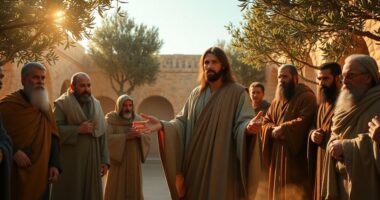In Luke 22:14-23, you witness the Last Supper, where Jesus shares a final meal with His apostles before His impending sacrifice. He breaks bread, symbolizing His body given for them, and pours wine, representing the new covenant in His blood. This moment introduces the Lord's Supper, highlighting themes of sacrifice and redemption. As betrayal looms in the air, deep questions about loyalty arise. There's so much more to uncover about this pivotal event that shaped Christian faith.
The Last Supper, a pivotal event in Christian tradition, took place during the Passover meal when Jesus gathered with His apostles. This moment was steeped in deep significance, as Jesus expressed His heartfelt desire to share this meal with them before His impending suffering. As you reflect on this gathering, you can almost feel the weight of the atmosphere, knowing that it marked the beginning of a new chapter in the relationship between God and humanity.
During the meal, Jesus took the bread, broke it, and declared it to be His body given for His followers. With this simple act, He instituted the Lord's Supper, urging His apostles to do this in remembrance of Him. This wasn't just a casual meal; it was a foundational moment that would shape Christian practice forever. By breaking the bread, Jesus was foreshadowing the sacrifice He'd soon make, inviting His apostles to remember His body's significance in the days to come.
After sharing the bread, He took a cup, referring to it as the new covenant in His blood. This was no ordinary cup; it symbolized the promise of salvation through His sacrifice. As He spoke these words, He emphasized the importance of His blood being shed for them, linking their salvation directly to His impending death. The notion of a new covenant would resonate through the ages, marking a shift from the old ways to a relationship grounded in grace and love.
Amid this sacred exchange, Jesus revealed that one among them would betray Him. The room fell silent as tension rose; each apostle questioned who could commit such an act. The betrayal hung in the air, a dark shadow over an otherwise holy occasion. It's a stark reminder that even in the closest circles, human frailty and sin can disrupt the divine plan.
The narrative of the Last Supper not only establishes a crucial Christian practice but also fulfills Old Testament prophecies about the Messiah's suffering. As you meditate on this event, consider how it encapsulates themes of sacrifice, remembrance, and redemption. The Last Supper invites you into a deeper understanding of faith and the transformative power of Jesus' love, setting the stage for the ultimate act of grace that would follow.
Frequently Asked Questions
What Is the Meaning of Luke 22 14 23?
When you explore Luke 22:14-23, you see a pivotal moment where deep emotions collide with significant actions.
It highlights the importance of shared meals, emphasizing connection and remembrance. You notice the symbolism in bread and wine, representing sacrifice and new beginnings.
This passage also introduces themes of betrayal, reminding you that even in close relationships, trust can falter.
Ultimately, it's about understanding the weight of commitment and the promise of renewal.
What Is the Message of the Last Supper?
The message of the Last Supper emphasizes the importance of sacrifice, community, and remembrance.
As you reflect on this event, you realize it calls you to partake in a deeper connection with others, recognizing the significance of shared experiences.
It reminds you to honor the sacrifices made for you and encourages you to embrace unity and fellowship with those around you.
This moment invites you to live out these values in your daily life.
What Is the Scripture for the Last Supper?
When you're looking for the scripture on the Last Supper, you can find it in Luke 22:14-23.
This passage details Jesus gathering with His disciples for a pivotal meal. During this time, He takes bread and wine, symbolizing His body and blood, while also announcing His imminent betrayal.
This moment establishes a significant ritual for believers, inviting you to remember His sacrifice and the new covenant between God and humanity.
What Is the Last Supper in the Bible Luke 22?
Isn't it ironic how a simple meal can hold such profound significance?
In Luke 22, you witness a pivotal moment where Jesus shares a Passover meal with His disciples. During this gathering, He takes bread and wine, symbolizing His body and blood. He speaks of betrayal, revealing the gravity of the moment.
This event lays the groundwork for communion, reminding you of sacrifice and the deep connection established between believers and God.
Conclusion
As the final morsels vanished and the echoes of laughter faded, you felt the weight of destiny in the air. The bread, a symbol of sacrifice, crumbled softly in your hands, while the wine shimmered like the promise of a new dawn. In that sacred moment, you grasped the threads of love and betrayal woven intricately together. The Last Supper wasn't just a meal; it was a poignant reminder that every ending carries the seeds of a profound beginning.










